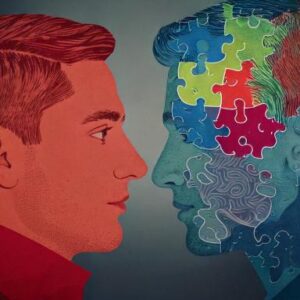Neurodiversity redefines mental health diagnoses by challenging traditional medical models that pathologise cognitive differences, advocating instead for a perspective that views these differences as natural variations within human biodiversity. This paradigm shift emphasises the importance of societal adaptation and acceptance over medical treatment or cure.
Key Insights
Reframing Mental Health: Neurodiversity challenges the traditional medical model by viewing cognitive differences, such as autism, not as disorders needing treatment but as natural variations that require societal support and acceptance (Chapman, 2021; Baron-Cohen, 2017; Wakefield et al., 2020). This perspective suggests that mental health should be understood in terms of diversity rather than pathology.
Social and Ecological Models: Proponents of neurodiversity advocate for ecological models that consider the relational and collective contributions of individuals, rather than focusing solely on individual functionality (Chapman, 2021). This approach aligns with social-relational models of disability, which emphasise the role of societal structures in defining disability (Chapman, 2021; Miclea, 2024).
Biopsychosocial Approach: The neurodiversity paradigm encourages a shift towards a biopsychosocial model, which integrates biological, psychological, and social factors in understanding mental health. This model moves away from deficit-focused diagnoses towards a more inclusive understanding of neurodevelopmental conditions (Doyle, 2020; Fletcher‐Watson, 2022).
Impact on Diagnosis and Practice: Neurodiversity calls for a reevaluation of diagnostic criteria and practices, urging a move away from rigid classifications towards more flexible, inclusive approaches that recognise the strengths and challenges of neurodivergent individuals (Baron-Cohen, 2017; Pantazakos & Vanaken, 2023; Hobson et al., 2024).
Challenges and Controversies: While neurodiversity offers a more humane framework, it also faces criticism for potential social fracturing and the risk of undermining necessary support for those who experience significant challenges (Miclea, 2024; Wakefield et al., 2020). There is ongoing debate about the balance between recognising diversity and addressing genuine needs for support.
Conclusion
Neurodiversity redefines mental health diagnoses by promoting a view of cognitive differences as natural variations rather than disorders. This approach emphasises societal adaptation and support, advocating for more inclusive and flexible diagnostic practices. While it offers a more humane perspective, it also presents challenges in balancing diversity recognition with the need for support.
References
Baron-Cohen, S. (2017). Editorial Perspective: Neurodiversity – a revolutionary concept for autism and psychiatry. Journal of child psychology and psychiatry, and allied disciplines, 58 6, 744-747. https://doi.org/10.1111/jcpp.12703
Chapman, R. (2021). Neurodiversity and the Social Ecology of Mental Functions. Perspectives on Psychological Science, 16, 1360 – 1372. https://doi.org/10.1177/1745691620959833
Doyle, N. (2020). Neurodiversity at work: a biopsychosocial model and the impact on working adults. British Medical Bulletin, 135, 108 – 125. https://doi.org/10.1093/bmb/ldaa021
Fletcher‐Watson, S. (2022). Transdiagnostic research and the neurodiversity paradigm: commentary on the transdiagnostic revolution in neurodevelopmental disorders by Astle et al. Journal of Child Psychology and Psychiatry, and Allied Disciplines, 63, 418 – 420. https://doi.org/10.1111/jcpp.13589
Hobson, H., Toseeb, U., & Gibson, J. (2024). Developmental language disorder and neurodiversity: Surfacing contradictions, tensions and unanswered questions. International journal of language & communication disorders. https://doi.org/10.1111/1460-6984.13009
Miclea, B. (2024). Neurodiversity and Mental Disorders. BRAIN. Broad Research in Artificial Intelligence and Neuroscience. https://doi.org/10.18662/brain/15.2/574
Pantazakos, T., & Vanaken, G. (2023). Addressing the autism mental health crisis: the potential of phenomenology in neurodiversity-affirming clinical practices. Frontiers in Psychology, 14. https://doi.org/10.3389/fpsyg.2023.1225152
Wakefield, J., Wasserman, D., & Conrad, J. (2020). Neurodiversity, Autism, and Psychiatric Disability. https://doi.org/10.1093/oxfordhb/9780190622879.013.29
